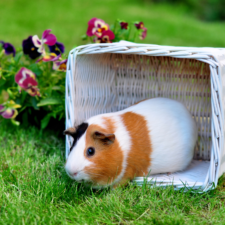Are you enjoying your summer? It goes by pretty fast! Many of our furry patients love this time of year. That includes bigger pets, like dogs, but also the smaller ones, like Guinea pigs. Heat can be tough on these little guys! An Aurora, CO vet offers some care tips for cavies below.
Risk
Seniors, young pigs, and chubby furballs are at higher risk than others. Longhaired cavies can also get very hot. Take extra care if your pint-sized pals fall into any of those categories!
Treats
Cavies love cool snacks just as much as the rest of us do. Offer your little furballs some fresh cucumbers or frozen berries or banana slices. Just stick with safe foods. Also, don’t go crazy with sugary snacks.
Cage Cooling
Consider putting ice packs or frozen towels in your pets’ cage. You can even freeze a bottle of water and put that in there for them. Just put a towel over it, so your cavies don’t chew it. Fans and air conditioners also help, though you don’t want the air blowing into the cage. You’ll also need to keep the cage out of direct sunlight.
Grooming
Brushing your cavies regularly will remove any dead fur, which can get hot and itchy. You can also wipe your tiny buddies down with a cool, damp cloth.
Hideouts
Make sure your cavies have a cool area to retreat to. You may want to give your fuzzy pals a ceramic plant pot to hide in: these usually stay cool. Tunnels are also a good option. Avoid plastic ones: plastic is a poor insulator.
Warning Signs
Watch for signs of heatstroke. Restlessness is one: your pet may become ansty and irritable as their discomfort grows. Other red flags include panting, drooling, lethargy, discolored gums, and/or elevated heart rate.
Cooling Your Pig
If you know or suspect that your tiny furball is too hot, you’ll need to cool him down right away. Hold him in front of an open freezer, or wrap him in a damp towel for up to five minutes. Don’t put him in water or pour water over him. This could make him go into shock! You can also offer lukewarm water through a syringe, bottle, or straw. Call your vet for further instructions.
Do you have questions about Guinea pig care? Call us, your local Aurora, CO animal clinic, today!







